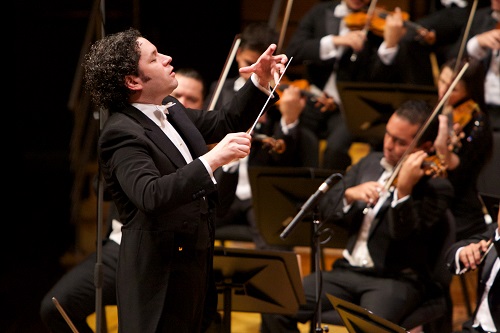
 Germany Musikfest Berlin 2016 [6] – Villa-Lobos, Messiaen: Jean-Yves Thibaudet (piano), Cynthia Millar (ondes martenot), Orquesta Sinfónica Simón Bolívar/Gustavo Dudamel (conductor), Philharmonie, Berlin, 13.9.16. (MC)
Germany Musikfest Berlin 2016 [6] – Villa-Lobos, Messiaen: Jean-Yves Thibaudet (piano), Cynthia Millar (ondes martenot), Orquesta Sinfónica Simón Bolívar/Gustavo Dudamel (conductor), Philharmonie, Berlin, 13.9.16. (MC)

Villa-Lobos: Bachianas Brasileiras No.2
Messiaen: Turangalîla Symphony
Messiaen’s best known orchestral work, his large scale Turangalîla Symphony, is an exotic treat. Conductor Dudamel knows Turangalîla well having heavily toured with the work. A $1,000 commission by Serge Koussevitzky for the Boston Symphony Orchestra Turangalîla was written in 1946/48 mainly in France. As Koussevitzky was ill, the work was introduced by the young Bernstein in 1949 at Boston. Inspired by the Tristan and Isolde legend its title is derived from two Sanskrit words ‘turanga’ and ‘lîla’ referring to time, creation, joy and love. Messiaen described his twentieth-century masterpiece as “a song of love, a hymn to joy. It’s also a vast counterpoint of rhythms.”
This substantial, complex and eclectic ten movement score of sincere expression, but sometimes sprawling, brash and repetitive was just the sort of work for the Orquesta Sinfónica Simón Bolívar and Dudamel to get its teeth into. Requiring a piano, ondes Martinot, vibraphone, celeste and keyed glockenspiel, standing out was the large percussion battery and assembly of brass instruments. Favouring reasonably brisk tempi Dudamel drove his players along and was assured in keeping the wildly opulent, multi-layered orchestral elements together with as clear a focus as he could muster. Striking was the raw power Dudamel gave to the grand climaxes which were of a tremendous volume without thankfully too much compromise of unity. Soft and gentle, sultry and dreamy the perceptively played Jardin du Sommeil d’amour (Garden of Love’s Sleep) was an oasis of calm proving that Turangalîla isn’t all brash chutzpah. Jean-Yves Thibaudet was the expert piano soloist and Cynthia Millar played the ondes Martinot with real skill. A notoriously difficult electronic instrument to balance I felt the ondes Martinot should have been a touch louder. A gala of whirling rhythms and a wide palette of orchestral sonorities, this performance of Turangalîla under Gustavo Dudamel thrilled and captivated from first note to last.
Opening the concert was the Villa-Lobos Bachianas Brasileiras No.2 one of the nine suites the composer had written or various combinations of instruments and vocal forces. Written in homage of J.S. Bach, Villa-Lobos was fusing baroque compositional techniques with Brazilian folk idioms. Scored for orchestra the four movement Bachianas Brasileiras No.2 is a work one would imagine would suit Sinfónica Simón Bolívar eminently. Yet Dudamel’s players were in curiously uninspiring form with the overall unity was not as tight as I expected. Striking was the saxophone solo in the second movement Aria: O canto do Capadocio that evoked to me the mood of a Western film score.
Michael Cookson